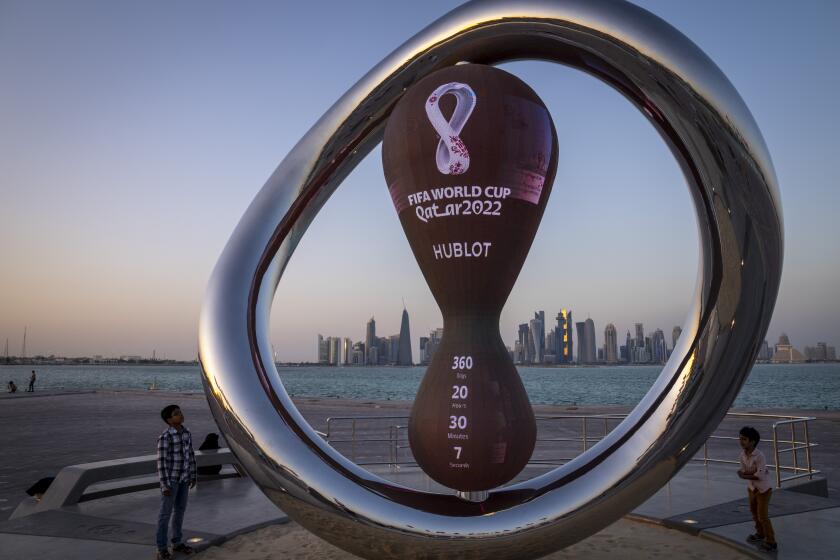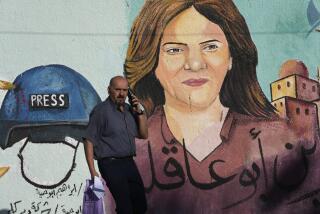The world will be watching as Qatar hosts the 2022 World Cup ... for better or worse
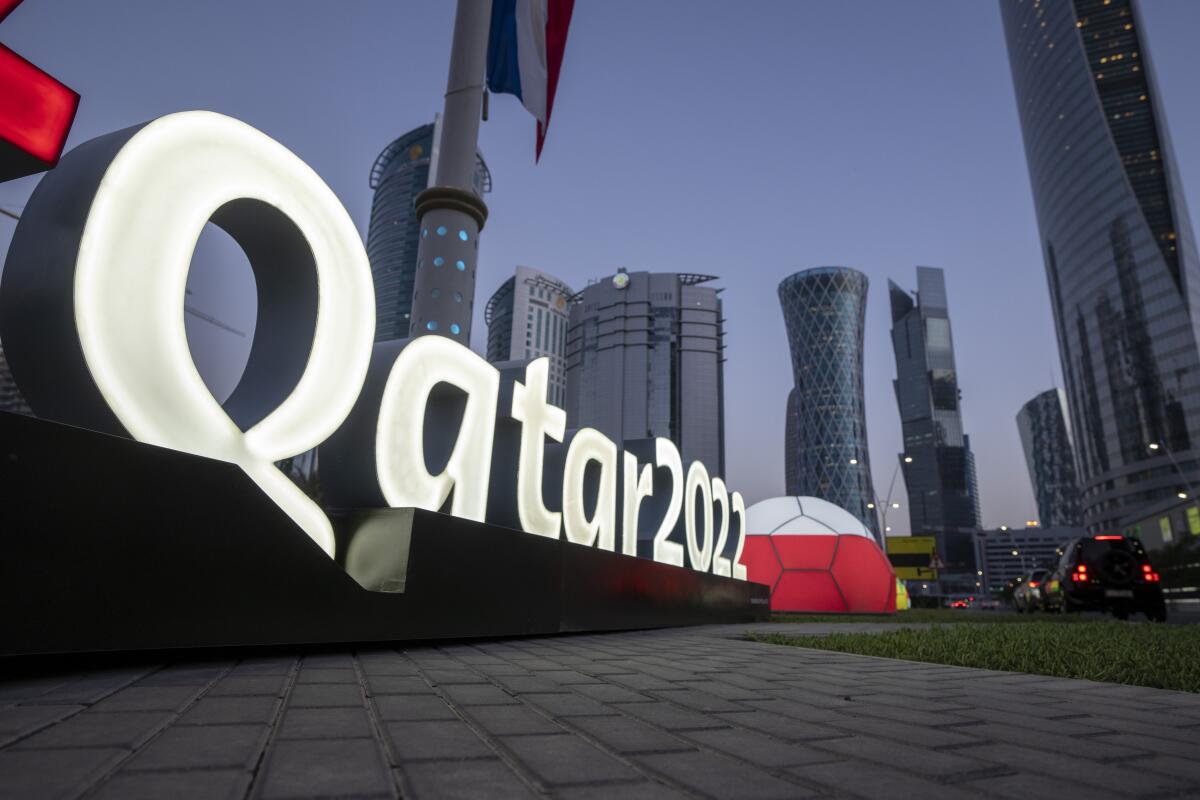
DOHA, Qatar — The clock in the middle of Doha’s scenic bayside promenade, which has been counting down to kickoff of the first fall World Cup, will hit 100 days on Friday. To Malcolm Bidali, that was cause for neither celebration nor despair.
“I don’t think the World Cup in Qatar is a bad thing,” he said flatly. “Every country deserves hope to host the World Cup.”
Even a country that imprisoned and fined Bidali for speaking out on widespread labor and human rights abuses? One in which homosexuality is against the law, press freedoms are restricted and the mildest public protest can result in a prison sentence?
“Here’s the thing,” Bidali said from his home in Kenya, where he returned after being released from a Qatari jail cell last summer. “If anyone wanted to do anything about anything, they would have done it the moment [a Qatar World Cup] was announced. That was 2010. People could have come out and said, ‘OK, let’s boycott this thing.’
“But now it’s too late. Migrant workers would face retaliation. Qatar will say, ‘Oh, we’ve lost the World Cup because of you migrant workers.’ So it should definitely go on. But I think people should be more aware of what’s going on.”
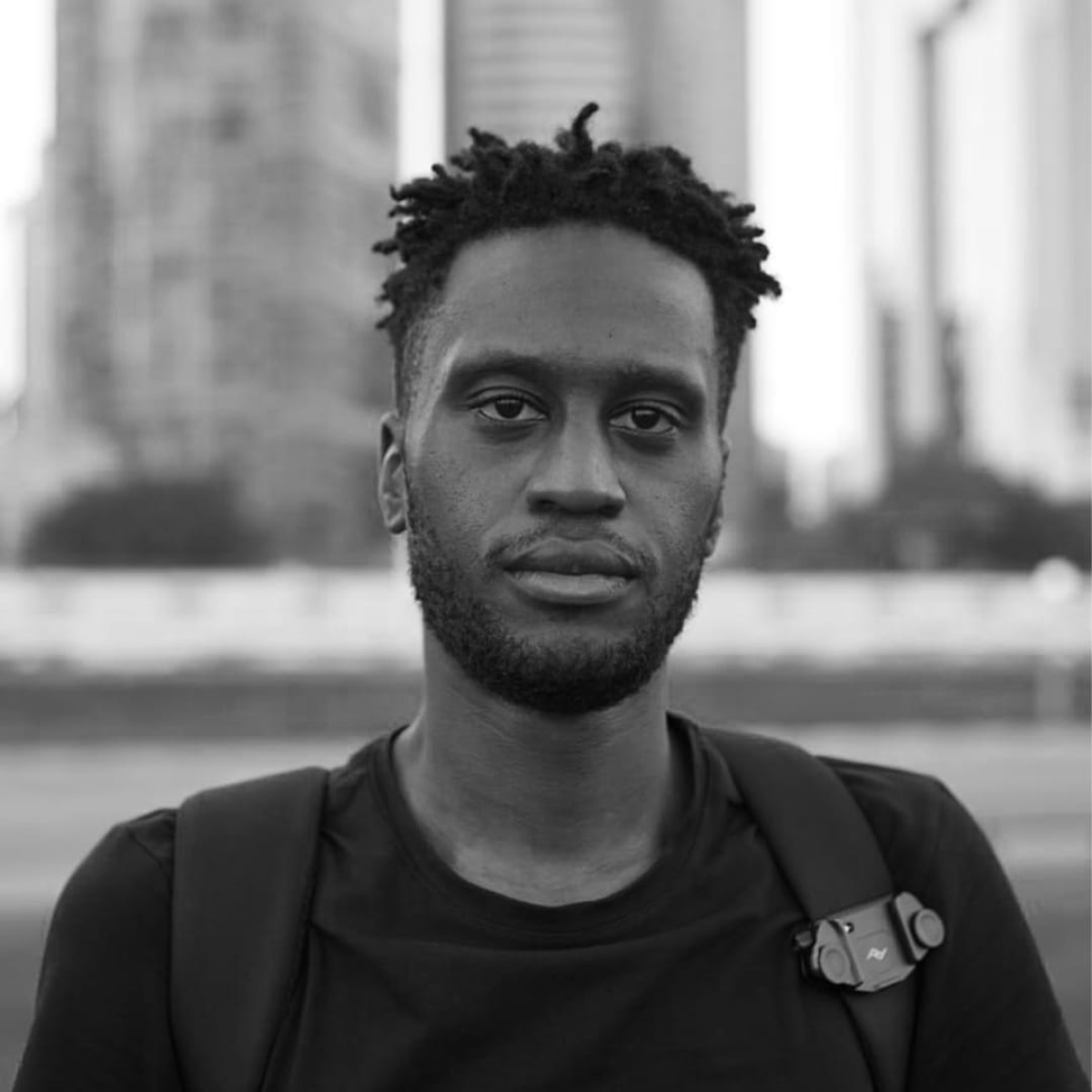
The 2022 World Cup, the first to be held in the Middle East, has been awash in controversy from the start. The vote that awarded the tournament to Qatar was rife with allegations of corruption and cheating. Shortly after the bid was approved, human rights organizations voiced concerns over labor practices in Qatar that bound migrant workers to their employers, inviting mistreatment and abuse.
Yet in a little more than three months, some 1.2 million soccer fans will begin pouring into Doha, a city smaller in size than Akron, Ohio. And they will watch games in stadiums built by migrant workers, eat in restaurants staffed by migrant workers and take Ubers and subway cars driven by migrant workers.
Qatar certainly isn’t the only country that has benefited from — or been accused of mistreating — migrant workers. They have been particularly integral to the growth of many Persian Gulf states, all of which long have been criticized for exploiting foreign laborers and muzzling those who complained.
But with much of the globe focused on the World Cup, Qatar has fallen under the microscope — a fact that already has led to change, such as the abandonment of the kafala system, a legal form of indentured servitude. Bidali and others are hoping to use the focus of the monthlong tournament to bring more progress.
“It should definitely go on. But I think people should be more aware of what’s going on.”
— Labor rights activist Malcolm Bidall on the World Cup in Qatar
That’s why even those who have opposed the harsh labor practices in Qatar insist the games must go on. And they hope the world will be watching.
“It’s a good opportunity for migrant workers,” said Bidali, who co-founded the non-governmental human rights group MigrantDefenders.org. “Without the World Cup, none of these reforms would have been possible. Once the World Cup is over, all the cameras [will] turn away to the next big thing.”
Isobel Archer, the gulf program manager for the London-based Business & Human Rights Resource Centre, agrees. She said her group has documented halting progress on workers’ rights and fears that will slow when FIFA packs up and goes home in late December.
“The whole narrative has been built around the World Cup,” she said. “It is this transformational moment. So much has been achieved. Certainly we don’t want to see these reforms just unravel and disappear because the World Cup is no longer in Qatar.”
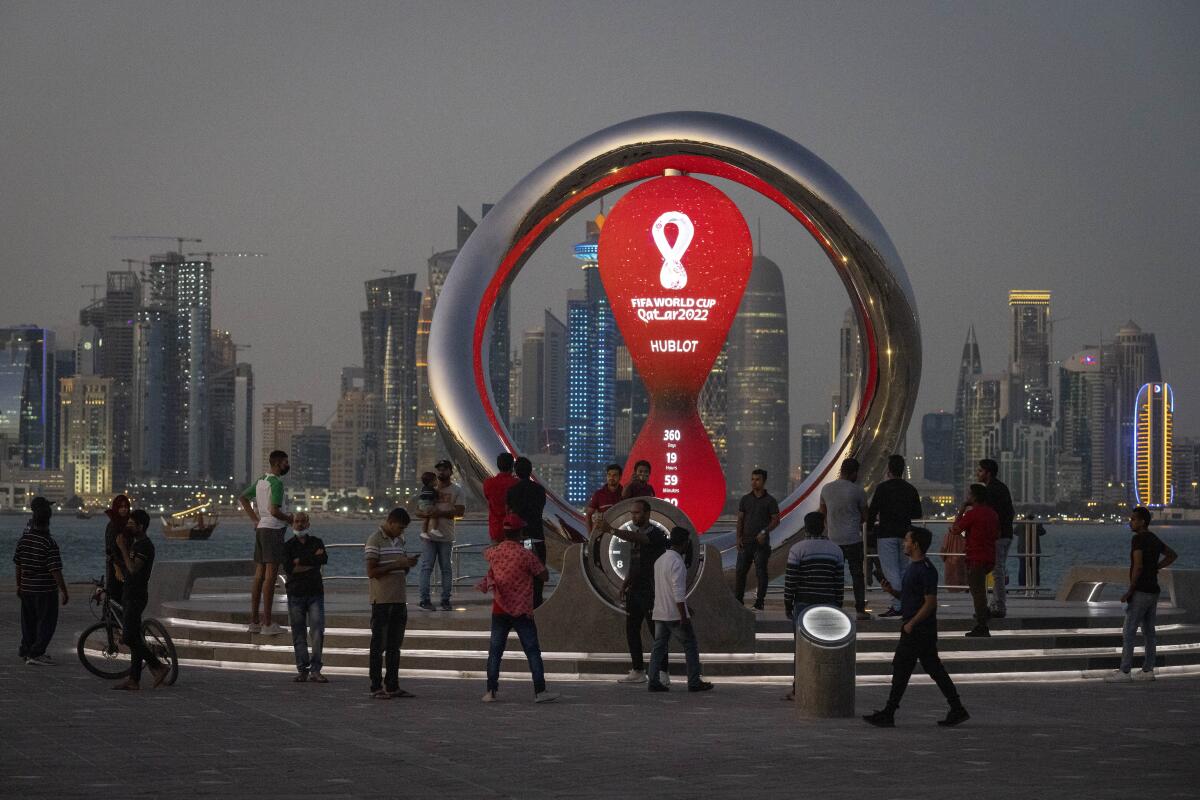
A 50-mile-wide peninsula that juts out from Saudi Arabia into the Persian Gulf between Bahrain and the United Arab Emirates, Qatar is a deeply conservative Islamic country. A former British protectorate, it gained independence in 1971 and, over the past half-century, has been transformed by oil reserves into one of the richest countries in the world.
It’s also home to one of the world’s most bifurcated societies.
Qatari citizens have the highest per-capita income on the planet, with annual average earnings of $129,360, according to the FinancesOnLine Research Center. And though they pay no income tax, those citizens receive free education, health and child care and are charged nothing for water or electricity, among other perks.
However, citizens make up less than 15% of the country’s 2.8 million inhabitants; many of the others are migrant workers from Africa and southwest Asia who work in construction, as domestic help or in security and the service sector. A 16-month-old labor-reform measure has set their minimum wage at $275 a month. Migrant workers also receive accommodations, food and transportation to and from their jobs.
The controversial kafala, or sponsorship, system — the term comes from the Arabic word for “support” or “vouch” — is the legal framework that had come to define the almost feudal relationship between migrant workers and employers in eight Gulf countries. It was created to ensure cheap labor in booming economic times but contained few provisions to protect workers, who paid exorbitant recruitment fees to get those jobs and had no protection until local labor laws were enacted.
Qatar has moved to reform the system that once linked workers’ residency status to their employer and required their sponsor’s permission to change jobs, quit or even leave the country.
Fatma Al-Nuaimi, the executive communications director of the Organizing Committee of the Qatar 2022 World Cup, talks about the tournament.
“I actually had better living conditions in prison” than in the squalid, labor camps, Bidali said. “I had better food. … It’s solitary confinement, but at the same time it’s a room to myself.”
According to the Guardian, there have been 6,750 deaths of South Asian migrants in the 12 years since Qatar was awarded the right to host the World Cup. Many of those deaths were traced to routinely working as many as 10 hours a day in summer temperatures of 113 degrees or more.
Last spring, new regulations were adopted that banned work outdoors between 10 a.m. and 3:30 p.m. from June to mid-September and required that all work must stop any time the Wet Bulb Globe Temperature rises above 89 degrees. The WBGT is a measure of heat stress that takes into account temperature, humidity, wind speed, sun angle and cloud cover
Asked about the deaths during a Milken Institute conference in May, FIFA president Gianni Infantino said: “FIFA is not the police of the world or responsible for everything that happens around the world.”
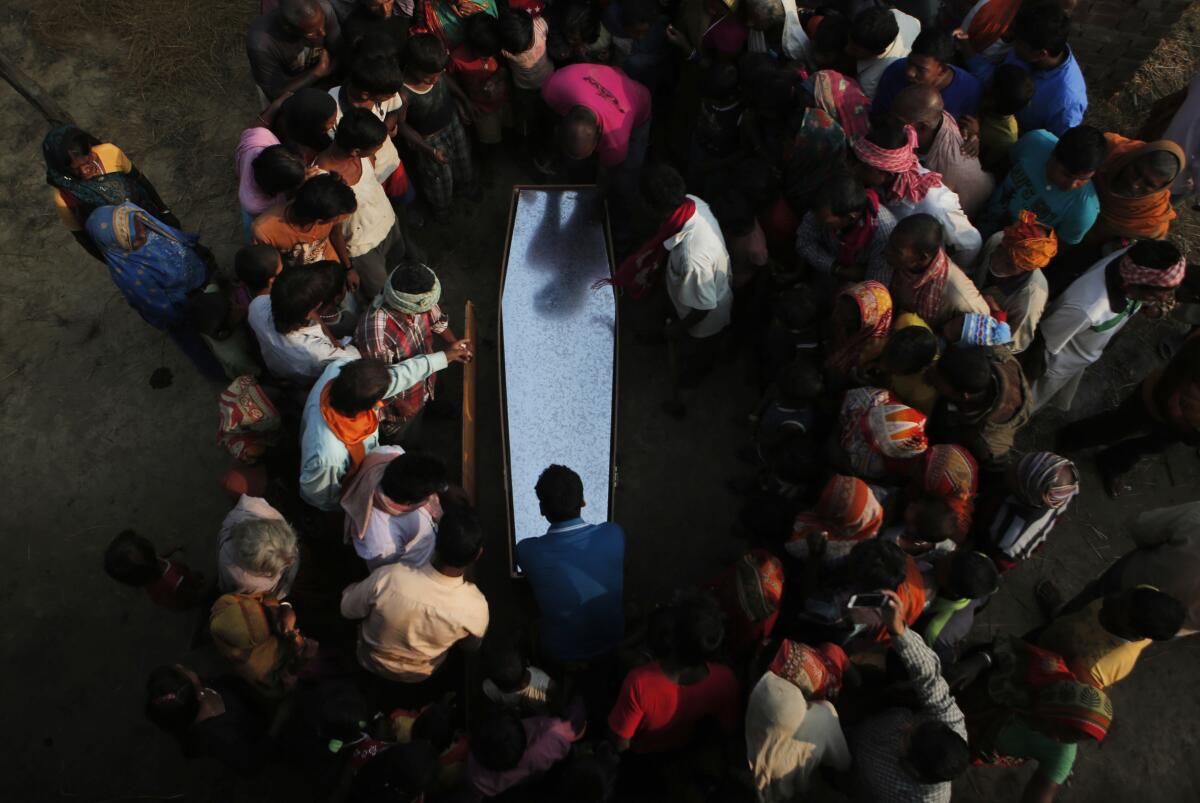
But the Qatari government is responsible for what happens within the country’s borders and, in response to international criticism, it banned the final remnants of the kafala system two years ago. It also adopted a Workers’ Charter that Qatar’s Supreme Committee for Delivery and Legacy — basically the World Cup organizing committee — said ensures the well-being, safety and dignity of workers engaged on projects tied to the tournament.
Fatma Al-Nuaimi, the media and communications executive director for the Supreme Committee, said the World Cup has been an important accelerator for those reforms and she pushed back on the idea that Qatar is trying to ignore or gloss over the abuses.
Mohammed Abdullateef, a soccer fan in Qatar, has amassed one of the largest collections of historic World Cup tickets in the world.
“Then why are we hosting the World Cup if we don’t want anyone to come here or to expose ourselves?” she said. “With the World Cup you will always have the spotlight, which gives the good side and the bad side of it.”
If the kafala reforms and the Workers’ Charter are signs of progress, they are not without drawbacks — like a gaping loophole in the laws that left compliance up to businesses. Not surprisingly, most companies said they were obeying the rules despite worker complaints to the contrary.
“Human Rights Watch acknowledges and applauds the reforms the Supreme Committee has put in place,” said Minky Worden, the New York-based advocacy group’s director of global initiatives. “But all along our criticism has been that [new-found rights] needed to be extended to the whole country. And … we had plenty of evidence that they weren’t being implemented.”
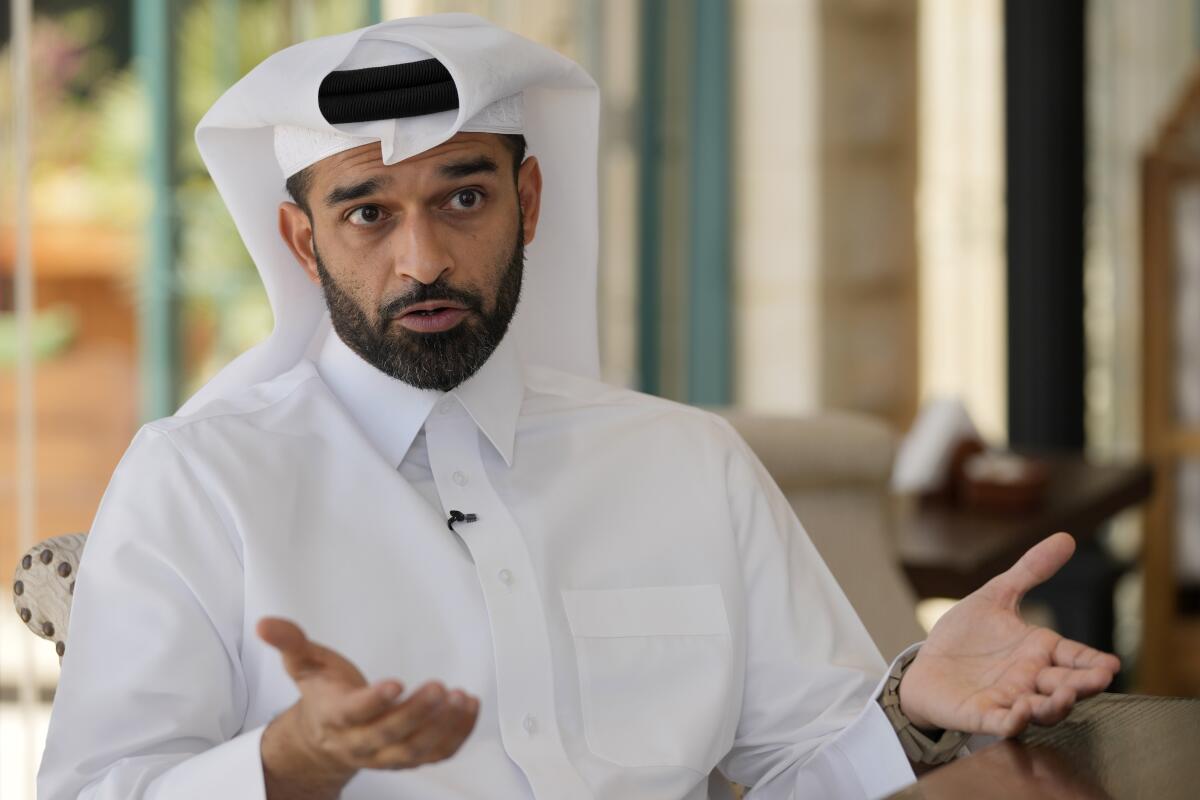
In response to questions from the Business & Human Rights Resource Centre, 14 multinational hotel brands operating in Qatar detailed only modest progress undertaking the “human rights due diligence” of the recruitment agencies with which they work. But, the center’s report added, there has been a noticeable increase in transparency in Qatar’s hospitality industry, something the center called “a crucial step in the right direction.”
“If there is an area that we think requires more improvement, it’s the enforcement part of this,” Al-Nuaimi said. “You can see there is change happening and there is progress. But there is room for improvement.“
Fans have apparently grown tired of waiting for the COVID pandemic to wane, judging by the crowd of 93,702 that packed the Rose Bowl on Saturday night.
In the last decade, Qatar has played host to more than 600 international sporting events. Qatari officials have also met with International Olympic Committee president Thomas Bach ahead of a likely bid for the 2036 Summer Games.
Doha’s cosmopolitan flavor, world-class museums and the futuristic, ultramodern skyscrapers that crowd its shoreline — which immigrant labor helped bring to life — speak to Qatar’s ambition, as does National Vision 2030, a plan launched in 2008 that lays out economic, social, human and environmental development goals.
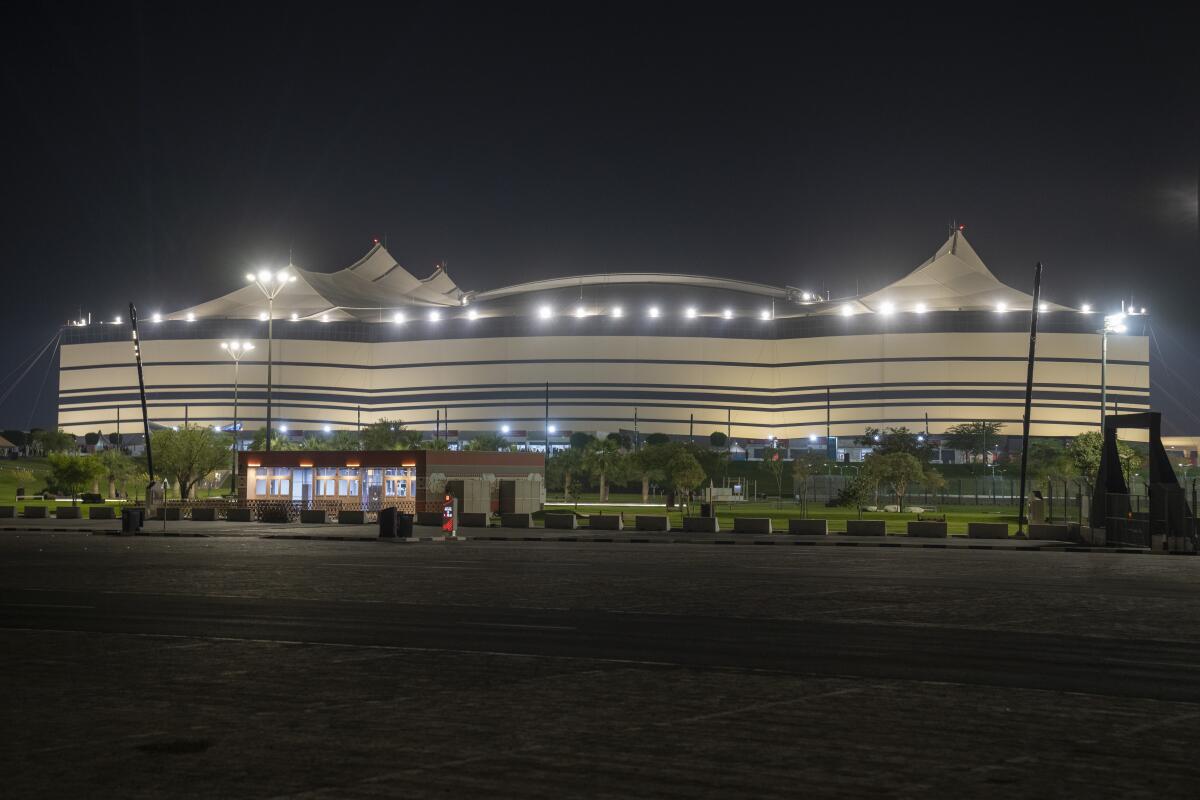
“Qatar is young. Not only in sports, in multiple fields,” Al-Nuaimi said. “We’re trying to transform. Qatar has always been branded [as] dependent on oil and gas. We need to be expanding to be more than that.”
That’s why the government has invested more than $200 billion in the project, funding new roads, an airport expansion, public transportation and other infrastructure development.
But much of that too was built by migrants toiling in the punishing desert heat and under other often-deplorable conditions.
In addition to the ongoing labor reforms, the Human Rights Watch’s Worden said she wanted the government to pay compensation to the families of workers who died in Qatar during the long run-up to the World Cup.
“The government knows how workers died. And the government chose to call it natural causes so the families couldn’t get compensation,” she said. “There’s a chance now — and it only exists before the first ball is kicked — to get compensation for those workers.
“Qatar has made more progress with respect to human rights in the last four years than it has in the last four decades because it is hosting the World Cup.”
— U.S. Soccer spokesman Neil Buethe
“That’s how we will know that Qatar is serious about not repeating these abuses: if it sets up a compensation fund and a migrant worker center.”
Bidali, 29, worked as a security guard for 4½ years before being jailed and expelled from Qatar for posting about his experiences online — under the pen name Noah — in hopes of improving working conditions, he said.
That led Qatari authorities to trace and arrest him in May 2021, holding him in solitary confinement for four weeks and charging him with receiving funds from “foreign agents” to propagate disinformation, a charge he denied.
(The laws that led to Bidali’s arrest, fine and expulsion from Qatar frustrated efforts to speak to other migrant workers, on the record, about their experiences in the country.)
“Most people come for money,” Bidali said of Qatari’s migrant workforce. “I know people who have taken their kids through school, who bought land, who’ve taken care of medical expenses. I know people who’ve paid all the bills and made investments. I know people who are now really successful and they got their seed money from being migrant workers.
“In our countries there are no jobs. That’s why we come to the Gulf. There’s always opportunities. But at the same time there’s so many violations that happen. It just depends on which company you’re working for.”
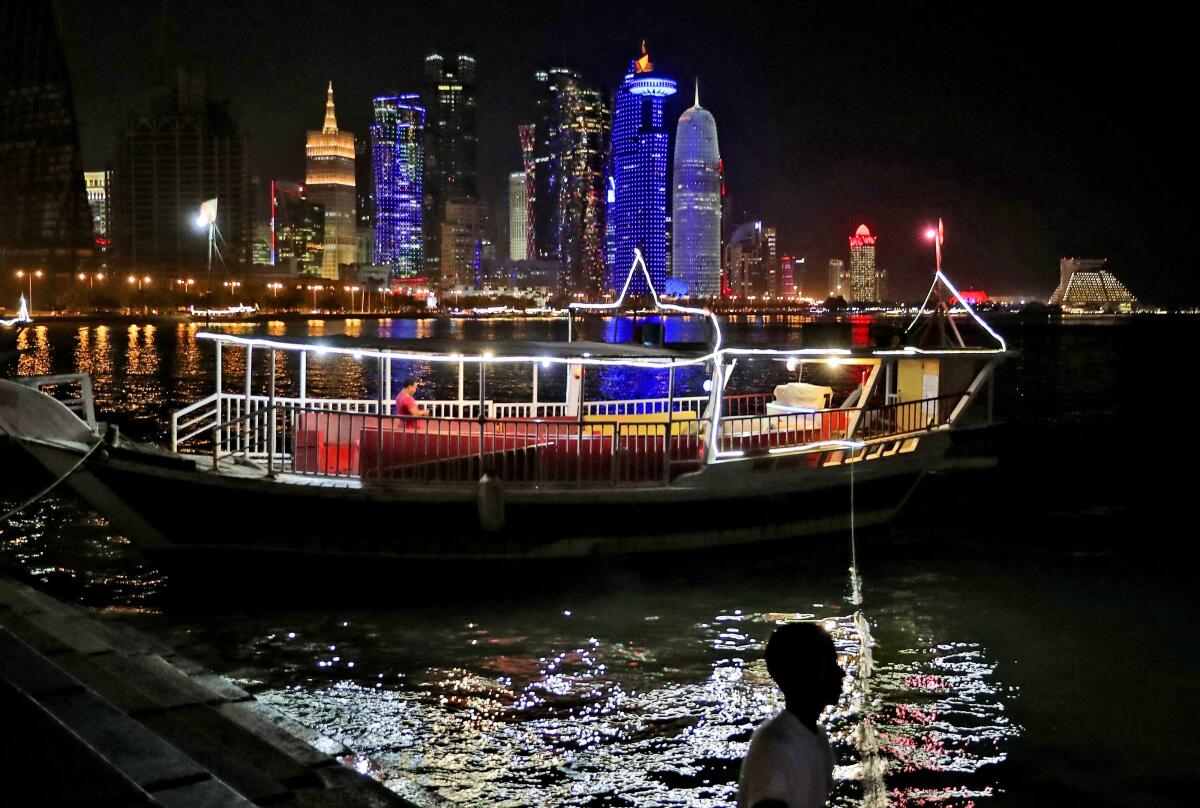
Or when you are working for them. Turns out that during a World Cup, when much of the planet is watching, is a good time.
As activist groups like Amnesty International and Human Rights Watch have attempted to shine a spotlight on the plight of migrant workers in Qatar, U.S. Soccer and other national federations have been working quietly behind the scenes, encouraging the Qataris to extend labor and social reforms and to stick with them when the tournament is over.
“We hope the World Cup being in Qatar can be a catalyst for continued change and progress in the country,” U.S. Soccer spokesman Neil Buethe said. “And hopefully, over time, across the region.”

